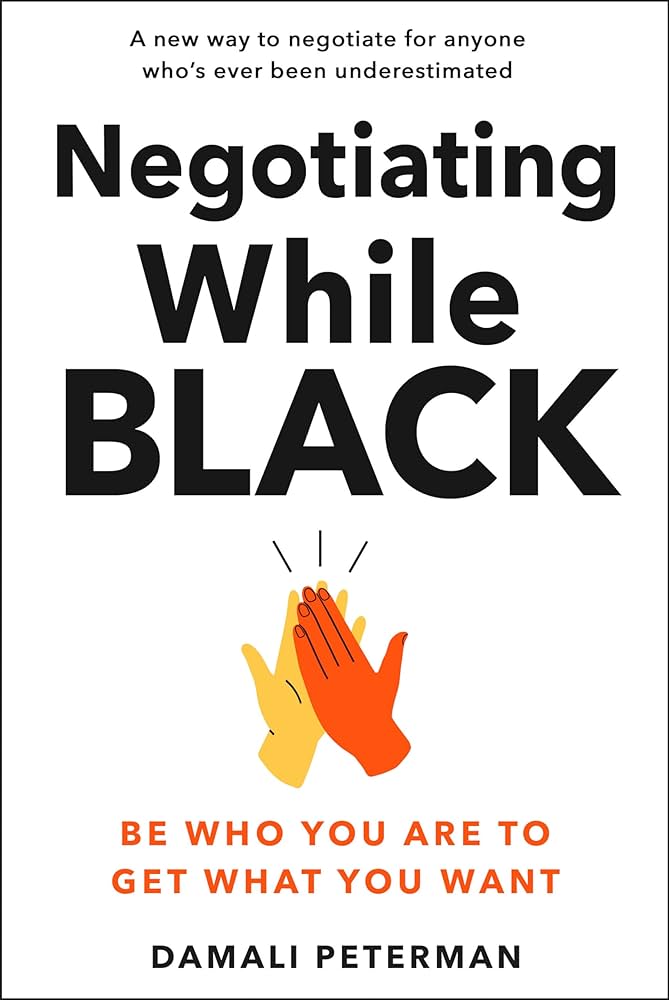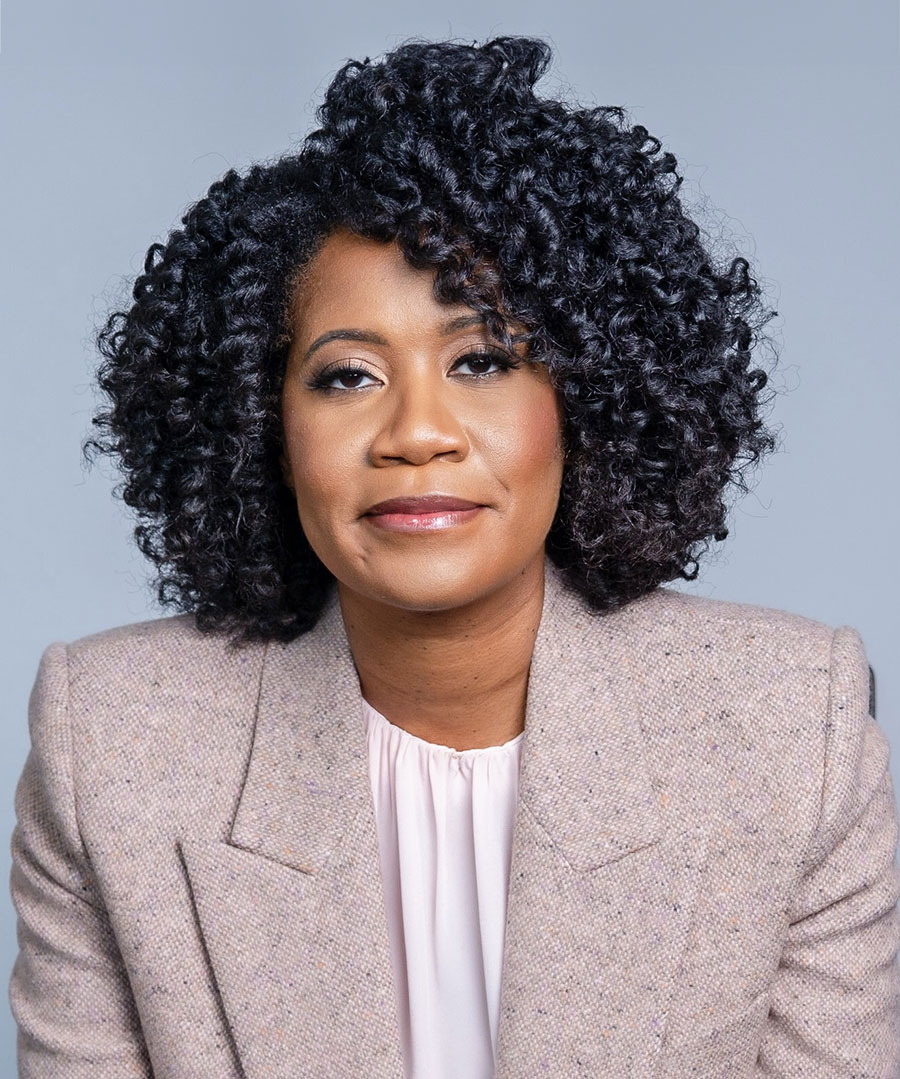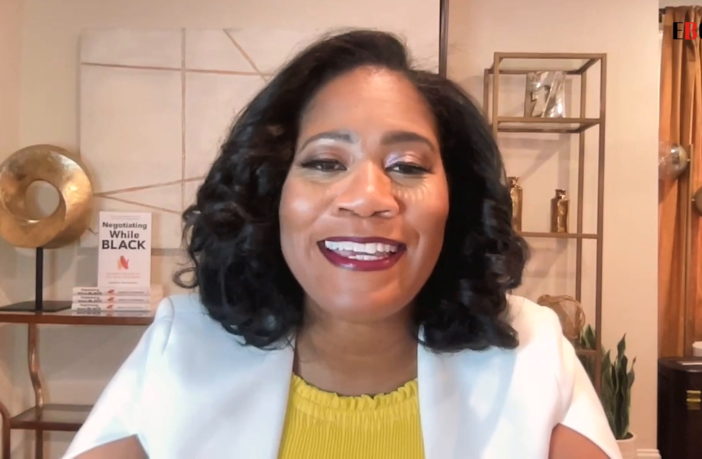I was tired of reading negotiation books through a lens of “that sounds good” but would that work for me as a ____? You fill in the blank for you, but for me it, I often filled in the blanks as young, Black, woman, American, etc. It was like the existing books didn’t consider the reader’s intersectionality or the realities of negotiating when implicit bias is present. I wanted people to see themselves in this book, regardless of what box you checked, that embraced each negotiator for the way they showed up in the world.
I wrote this book because globally people were seeking more tools to learn how to negotiate in their real life. I wrote this book because I believe that things can improve during my lifetime and that I could make the world a better place for you and for my sons and for your sons and daughters. I wrote this book to inspire other people to share their gifts and experiences with the world so that the literature reflects the melting pot of diversity and not just a plain‑vanilla approach to negotiations.
People tell me that they are bad at negotiating all the time. I once had a mom tell me that she was bad at negotiating, while simultaneously explaining to her son why he could have more screen time after homework but before bath time. Then, I saw this same mom advocate for her son when speaking with a teacher at a coffee shop. I think that we can sometimes be our own worst critic. And the truth is, sometimes we feel better negotiating for someone else (like the advocating mom!) than we do for ourselves. Also, we may not be fully aware of all the times that we have to negotiate daily (and therefore not giving ourselves credit!).
Negotiating While Black is the indispensable guide that I—as a lawyer and mediator—wish had existed earlier as I navigated workplaces as the only Black woman, advocated for my children attending predominantly white schools and mediated countless other bias-ridden settings. The negotiation books already on the bookshelves do not take a deep dive into implicit bias in negotiations. The approach prescribed by authors in this space pushes an “I did it this way and was successful, so if you negotiate like me, you will be successful too.” Those books don’t take into consideration the intersectionality of many of us negotiating in this multicultural world and how that could impact our negotiations.
Drawing on these experiences together with decades of wisdom as a trained negotiator in high-stakes situations, I developed successful strategies notably absent from other top negotiation books—tactics that work for all people, no matter your identity. From the Foundational Five skills to the Negotiation Superpowers, these tried-and-true techniques will lift readers to the next level of winning.
What is implicit bias and how does it show up in negotiations?
An implicit bias is a negative attitude, often one we are not consciously aware of, toward one person or group. Our implicit biases prejudice us against one another and affect our behavior and judgment. Though we may not be conscious of an implicit bias, it still affects our attitudes in ways that may block, sometimes for excellent reasons, the very empathy we are told to use. When two people have little in common, deadlocks may occur because of others’ implicit biases—or our own.
What are the “Foundational Five” negotiation elements?
1. Know what you want.
2. Know what you need.
3. Know how to actively listen.
4. Know how to communicate.
5. Know when to close.
I think people have the hardest time separating knowing what you want from what you need.
Knowing what you want means being able to identify the outcome you desire from a negotiation – in other words, to take a position or express a positional statement about what you want to happen. This sounds obvious, but it’s a step too many of us skip! A want can be tangible: I want a new car, a bigger raise, or for you to do the dishes. A want can also be intangible: I want respect or appreciation. Going into a negotiation with a clear want in mind (even if you don’t reveal that want right away) is vital.
A need is different from a want. If your want is “what you want to happen” then our need is “why you want it to happen.” A need is an interest. A need is usually the reason or rationale for you wanting what you want. Here are a few examples of knowing what you need: I need a new car because I need to commute to my new job. I need a raise to have extra cash to pay for my kid’s tuition. I need respect so that I can feel good when I go to work. I need appreciation to stay in this relationship. If there’s one need that trumps all others, I call that your “Million Dollar Need” – the why that drives everything you do. If you can identify and secure that in a negotiation, you’re golden.
 Image: courtesy of Penguin Random House.
Image: courtesy of Penguin Random House.
What should folks question when making distinctions about the needs of the negotiation scenario they are facing?
What do you want most in a negotiation you are currently facing?
Can you describe what you want to happen?
Why do you want what you are seeking?
What does it mean to you?
Do you have a “Million Dollar Need” (i.e., the need that drives all other needs)?
What is a “Negotiation Superpower”?
A negotiation superpower is a positive attribute or thing that make you distinctive. It is the unique value proposition that you bring to the negotiation that you may or not be aware of that you have! For example, grit, tenacity, fearlessness, patience, flexibility, superb listening skills— are all powerful tools that we may have developed in other aspects of our lives that we need to make sure we employ during our negotiations.
What is the main lesson to take away from Negotiating While Black?
There is no one-size-fits-all negotiation approach. You limit yourself and the universe of potential negotiated outcomes if you try to follow a copy-me model of negotiation. If there is just one takeaway from this book, it is you can be who you are and get what you want because the only constant in each of your negotiations is YOU!
Negotiating While Black: Be Who You Are to Get What You Want is now available wherever books are sold.

 Damali Peterman. Image: courtesy of Lumumba David of David Media Group.
Damali Peterman. Image: courtesy of Lumumba David of David Media Group.
Damali Peterman, Esq. is the Founder, CEO and Chief Conflict Resolver of Breakthrough ADR LLC. She is a lawyer, a highly sought-after mediator and a negotiator. She is also the author of “Negotiating While Black: Be Who You Are to Get What You Want.”



